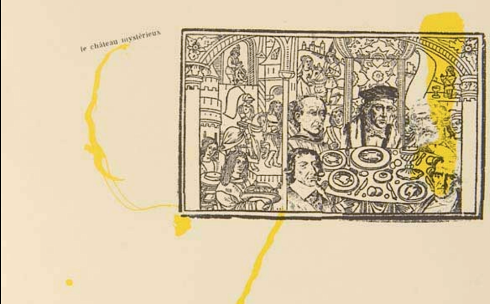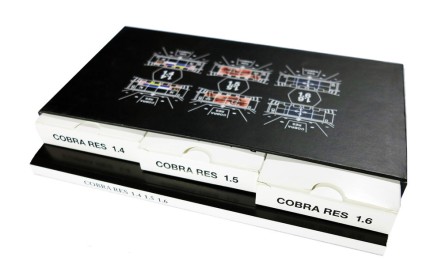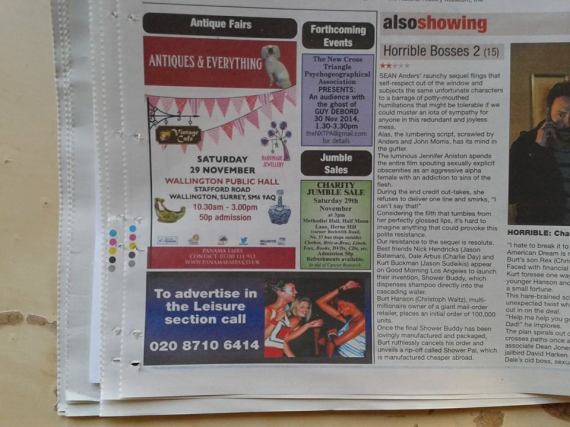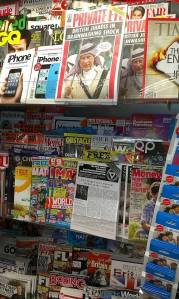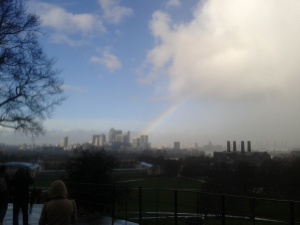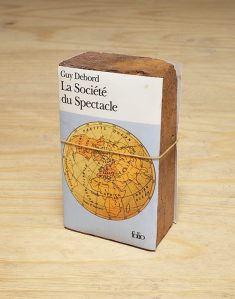New Book on Scandinavian SI – Cosmonauts of the Future – Mikkel Bolt Rasmussen & Jakob Jakobsen (Eds.)
April 28, 2015 § Leave a comment
New book on the Scandinavian SI from Mikkel Bolt Rasmussen and Jakob Jakobsen, featuring many texts never yet published in English!
Cosmonauts of the Future: Texts from the Situationist Movement in Scandinavia and Elsewhere
Publisher: Nebula Books & Autonomedia
Language: English
ISBN: 9788799365180
Debord and Jorn’s ‘Mémoires’ – Facsimile Translation
March 17, 2015 § Leave a comment
Someone, whose name I don’t know, has produced a facsimile translation of Debord and Jorn’s 1959 collaborative book Mémoires. The second of the duo’s détourned book projects, famous for its sandpaper cover – an idea later nicked by Tony Wilson for a Durutti Column album – it’s great to see this in a translated form at last.
It’s been a few years now since I first encountered it in facsimile, in the original French, I remember being struck by quite how visually attractive this object was, given that I had encountered it as something long held up as an extremist epitome of anti-art. Having since, I think, come to a better understanding of the SI, I can now see that assumption for what it was – the result of my main exposure to the SI having coming through the apparently ‘Debordist’ rhetoric of puritanical pro-situs, possessively policing the boundaries of ‘their’ hobby, without any real feel for the life of the SI’s various productions. Asger Jorn was the key to seeing things differently, for me at least, leading me back in the end, to a new and different understanding of Debord too. Of course the vitality of Jorn’s contribution in this work plays off Debord’s restrained melancholia to great effect. It was a fragile balance they held together for a while.
The influence of Chtcheglov and his visionary metagraphies is also keenly felt here. This blog is meant to be ostensibly about psychogeography and so reposting this translation is to recognise that this text should stand as one of the key contributions to the practice. Perhaps the reason it has remained somewhat outside of the now canonical offerings of Formulary for a New Urbanism, Theory of Dérive and Introduction to a Critique of Urban Geography is precisely because the psychogeographical revival was primarily an Anglophone phenomenon and this text therefore, largely eluded it. The section of the book referring to 1953 in particular, concerning the days immediately after Chtcheglov and Debord allegedly first formulated the dérive, provides as close to a direct account of their discovery of this practice as anything out there. It also gives a fine feel for the experience, which whilst by its very nature was transient and ultimately inexpressibly, nevertheless serves as a mnemonic to spark sentiments in me concerning my own experiences of a similar drifting. Although strangely, or perhaps appropriately, not those drifts of the last few years, when I have approached the practice in a more systematic fashion. Instead it throws up flashes of those of more youthful beginnings, 5-6 years ago, when I first arrived in this city, and would walk halfway across the night, and sometimes until dawn, with no map, mental or otherwise, through strange streets, having spent my bus fare on one last drink.
The book is also notable for other reasons, not least a fantastic and somewhat amusing collage of Hegel, Marx, Cardinal de Retz, Fourier and Machiavelli(?) all sitting down for dinner at the Round Table of ‘le Château Mystérieux’, while outside someone (Sir Galahad?) is questing for the Holy Grail. Even more than this, it is the only Situationist text – to my knowledge – to contain a mention of New Cross, Deptford, Peckham and Nunhead!
For all of these reasons, great to see this in translation.
You can get the PDF here….
And Finally… Debord & Jorn’s “Memoires” | Internationale Situationniste in English.
COBRA RES and Situationist Games: New Essay on Three-Sided Football
January 7, 2015 § Leave a comment
A new publication has just come out featuring a fascinating article on Three-Sided Football from local SE London club Strategic Optimism Football (previously mentioned on this blog…) and another from Class War Games protagonist and author on Guy Debord’s Game of War, Richard Barbrook talking about Debord’s intriguing board game. Details below:
The British Government’s emergency response committee COBRA convened in Whitehall three times, over three separate events, within three weeks in July and August 2014.
18th July 2014 in response to the shooting down of Malaysia Airlines Flight MH17 over Ukraine. (Chaired by Prime Minister David Cameron)
30th July 2014 in response to the continued outbreak of Ebola in West Africa. (Chaired by newly appointed Foreign Secretary Philip Hammond)
8TH August 2014 in response to IS forcing thousands to flee their homes and take refuge on Mount Sinjar, Iraq. (Chaired by newly appointed Defence Secretary Michel Fallon)
Examining the inter-play of emergency politics, COBRA RES has issued a set of emergency card games and an accompanying book of theoretical texts. The games invite the reader to become player by moving towards an active ‘participation’ within the grand narrative of each separate emergency episode.
Cards by: COBRA RES and H+Corp
Texts by: Richard Barbrook, Roland Bleiker, David Campbell, Derek Gregory, Nicolas Hausdorf, Emma Hutchinson,Theodore Price and Strategic Optimism Football Club.
via COBRA RES.
Spotted in the South London Press
November 28, 2014 § Leave a comment
Spotted in the South London Press, Friday 28th Nov 2014. Advert announcing that the New Cross Triangle Psychogeographical Association (them again) will be presenting an audience with the ghost of Guy Debord on Sun 30th!
Intriguingly, given my previous attempts to make contact, there is an email address. I am going to follow it up and report back any results.
BH.
Abolish All Rectangles!
November 23, 2014 § 1 Comment
I’ve just become aware of a new 3-sided football club / part-time psychogeographical outfit playing in SE London. They go by the name of Strategic Optimism Football (or Football Club?) and claim ancestry amongst a number of renowned, and some more obscure, psychogeographical groups or the 1990s, 2000s and the present. They also spin a fantastic yarn about their kit and iconography, stating that it features a triolectical realisation of industrial painting, occult magick and sploshing, and that it pertains to mysterious conspiracy concerning David Beckham, the number 23, Alastair Crowley, Jamie Reid and the leylines of New Cross. I’ve pasted the introduction from their site below and there’s a link at the foot of the post.
This doughty band of footballing psychogeographers was formed when the nomadic, autonomous university the University for Strategic Optimism used the occasion of a three-sided football match in New Cross to announce its auto-dissolution. Simultaneously the formation of a new triolectical football team was proclaimed – Strategic Optimism Football was born.
The UfSO declared that it was triolectically inverting Marcel Duchamp’s infamous gesture of “definitively abandoning” art in favour of chess. In their case, giving up politics in order to play three-sided football. However, SOF’s first game was played under the banner of an international day of action against gold mining in the Roșia Montană region of Transylvania – undermining their own futile gesture from day one. Incidentally, it is a little-known fact that it was from this very game that one of three-sided football’s key tactical dissimulations – the so-called “Rosia’s (Triple) Cross” – obtained its name.
‘The Optimists’ play in a multi-coloured kit, triolectically derived from industrial painting, occult magick and sploshing. They function as a home team for all those with no home, where all the shirts read Blissett. They have gone on to contest the Luther Blissett Deptford League in the 2013-14 and 2014-15 seasons and sent players to the 1th Triolectical Football World Cup in Silkeborg Denmark, in May 2014.
Click here to find out more about the arcane magicks encoded in their kit and iconography.
To contact S.O.F. – or if you fancy playing with us – follow the link and be transported into the psychogeometry of your dreams!
ABOLISH ALL RECTANGLES!
More Evidence of Psychogeographers in New Cross
June 25, 2014 § 1 Comment
Updating an earlier post from back in February, I was just sent this tantalising titbit by a friend. I am of the opinion that it must relate to the mysterious encounter I described on the blog in February and the weird group I met walking backwards around Greenwich.
She told me she came across this photocopied newsletter in WH Smiths in Canon Street, bearing the headline ‘Two World Cups and One World War = Three’ (which you can also just about make out in the photo). It states that it’s the newsletter of the same organisation I encountered at the Greenwich Observatory in February – the New Cross Triangle Psychogeographical Association. She said it looked like one of those free, desktop-published community newsletters one gets through the letterbox.
Sadly, she take the magazine with her, as it didn’t have a price (!!) So I didn’t get to have a look at!
Whilst this is clearly frustrating, at least I have the photo. It appears as if it was left amongst the football magazines, which might have been a deliberate, considering the headline. The shop is the same shop outside of which the mysterious ‘London Stone’ is sited. Obviously, I don’t think the placement was an accident therefore. Without the newletter in front of me, its difficult to know what it was about. Despite that, several important pieces of information do come out of this that might help me find them:
– Firstly, this group obviously operates beyond just South East London, but it does still seem to be based in New Cross, at least in name.
– It is ‘Psychogeographical Association’ and not ‘Committee’, as I had previously thought (still turns up nothing on Google though).
– Judging from the headline (?) they quite possibly have connections with the three-sided football events that have apparently been going on in recent months in Deptford (which I was meaning to write a post about, but didn’t get around to it yet…hopefully soon).
– The magazine appears to have the letters ‘FP’ in the top-left corner, although it is unclear what this stands for. One possible idea I had was that, given my encounter with them in February, that it might refer to the novel The Secret Agent, by Joseph Conrad. In that story, the anarchists issue a revolutionary pamphlet called FP (standing for the Future of the Proletariat). It seems a big coincidence if not a reference to Conrad’s text.
FURTHER UPDATE!
Since I wrote this, just a few days later, I spotted more evidence, this time in SE London. On Tuesday (1st July) I found this sticker in a pub toilet in New Cross… I’ll keep you posted with any further updates!
‘Psychogeography, Marx and Time’
February 16, 2014 § Leave a comment
Space/Place/Culture Public Seminar Programme #3
Thursday 20 February, 5.15pm-7.00pm (approx end time)
Room 315, MMU Business School
Duncan Hay (Independent scholar)
‘Psychogeography, Marx and Time’
Psychogeography is perhaps best known in the UK as a literary practice which, in the hands of writers such as Iain Sinclair, Will Self, Peter Ackroyd and others, has found its principal object in London. Yet the concept has its origins in the milieu of the Parisian avant-garde of the 1950s and 60s, where, defined by Guy Debord as ‘the study of the precise laws and specific effects of the geographical environment, consciously organized or not, on the emotions and behavior of individuals’, it was intended as part of a comprehensive reworking of Marxist thought which sought to revolutionise the practice and conditions of everyday life.
By analysing the differing conceptions of time and history that they discover in their respective cities, this paper will seek to investigate the differences between contemporary psychogeography and its radical antecedents, and at once open the question of what it might mean to reconnect psychogeography with the city which so influenced Marx’s understanding of industrial capitalism: Manchester.
About the Space/Place/Culture Public Seminar Programme:
The ‘spatial turn’ has opened up dynamic synergies – and occasional tensions – between the work of cultural geographers and researchers working in a range of fields across the humanities. As Douglas Richardson explains, ‘ideas, terminology, and concepts such as space, place, scale, landscape, geography, and mapping’ now permeate interdisciplinary academic research as ‘conceptual frameworks, methodologies, and core metaphors’. Saliently, Richardson – Executive Director of the Association of American Geographers – also points out that such tropes have become increasingly prominent within public life as evidenced, in this country, by a collective preoccupation with edgelands, psychogeography, liminal spaces, cultural cartography and so on. Moreover, the proliferation of digital geographical technologies – including Sat Navs and Google Earth – has revolutionised the practice of everyday life. Researchers at MMU have recognised the shared emphasis on geographic themes as a focus for both internal cross-disciplinary collaboration and as a means to engage wider publics with academic research; the Space/Place/Culture Public Seminar Programme is a forum where such research can be discussed, and is open to anyone.
All welcome.
Mysterious Psychogeographic Group Spotted in Greenwich
February 16, 2014 § 2 Comments
As a keen student of matters psychogeographical, I was excited yesterday to come across a group of individuals who evidently shared my fascination.
I have been keeping this blog for a little while now, trying to keep a record of various psychogeography-related goings on, particularly those taking place locally, in London. Over the course of this, I have been lucky enough to come into contact with a number of fascinating and intelligent folks working in the field. I often think I’ve read all there is to read on psychogeography, have walked with many of its more recent luminaries and have a pretty good handle on the range of activities locally, so it’s a wonderful surprise when every so often I come across something exciting and new. That was the case yesterday (Saturday 15th) when I quite literally bumped into some people in Greenwich, calling themselves the New Cross Triangle Psychogeographical Association.
I was walking to the Greenwich observatory, hurrying through a particularly unpleasant rain shower, when I collided with a pair of passersby, dressed in old-style rain macs that brought to my mind characters from a film noir. That wouldn’t have been particularly remarkable in itself, had the reason I bumped into them not been the fact that they seemed to be walking backwards.
I told them to look where they were going, but they said they could not, as it would interfere with their ritual. Obviously now I was intrigued and asked them what they were up to. Assuming they were telling the truth – a rather big assumption, granted – they told me with a straight face that they were operatives of a secret society calling itself the ‘New Cross Triangle Psychogeographical Committee’ and were involved in an important ritual to mark the 120th anniversary of an attempt to blow up the Greenwich Observatory, and, they insisted, abolish “absolute time”. They told me they were walking backwards to “circumnavigate the observatory in reverse” so that as they crossed the meridian they would ‘make time run backwards’. They also said it was an effort to send shock waves up the Greenwich leyline, into the belly of the British Establishment.
I watched them for a number of minutes, until their progress brought them back around to the meridian line. Spookily, at the exact moment they crossed the meridian, the rain stopped and a rainbow appeared over the pyramid of Canary Wharf! Psychogeographical energies indeed! 🙂
Here is a picture I managed to snap of the moment the sun burst through. I was also trying to get them in the picture, but of course I didn’t quite manage it (I was trying to be subtle, and my screen was foggy with rain). You can just about make them out though, in the bottom left corner of the image.
Clearly if they were really a secret society, then they surely wouldn’t have told me as much! Yet it was strange that they didn’t really seem to be an art group or anything, as they didn’t have any audience that I could see, and didn’t appear to be recording their activity in any way. Interesting though, and great that this kind of thing is going on just down the road! I had a quick google on them, but it turned up nothing. I suppose they will remain a mystery for now, but further updates will be posted here, should I find out more.
Apologies for paraphrasing their words, but if any members of this group happen to be reading, please do get in touch! correct me if I got any of this wrong, or to explain more about your work. I’d love to hear more about it, or join in some of your activities perhaps!
The Culmination of Separation
November 15, 2013 § Leave a comment
The Society of the Spectacle, published by Notting Hill Editions with an introduction by Will Self, is out this month.
via Guy Debord’s The Society of the Spectacle | Will Self | Books | The Guardian.
Barbican Blog — Will Self on Urban Wandering
September 18, 2013 § 3 Comments

Will Self on Urban Wandering
Ahead of a major new cinema season, Urban Wandering – Film and the London Landscape, writer Will Self explores the history behind the movement in this essay on ‘psychogeography.’
The French Marxian groupuscule known as the Situationist International, the ideological avatar of which, Guy Debord, coined the term ‘psychogeography’, both begins and arguably ended with film. Debord’s own film Hurlements en faveurs de Sade, was a typically avant garde concoction of screeching soundtrack and scumbled imagery, intended by its creator to be unwatchable. It was forced by Debord and his then confreres in the Letterist International the SI’s forerunner on to the programme at the Cannes Film Festival in 1952, where it attracted predictable opprobrium. 44 years later the hagiographic TV special Guy Debord, son art et son temps received equally negative responses – although for diametrically opposite reasons. In the parabola described between the edgy discontinuities of the former film, and the seamless banalities of the latter, we can if we choose, discern the compass of psychogeographic film making.
Except for this: if we consider psychogeography to be an examination – through creative praxis – of the free psychic interplay between the human mind and place, then just as ‘psychogeography’ long antedates Debord in London we can trace its origins via De Quincey and Wordsworth to Addison and Defoe, so psychogeographic film making is by no means confined to the would-be revolutionists of the Rive Gauche in the years leading up to les evenements of May, 1968. In the Barbican’s celebration of London’s psychogeographic interpretation there are films that verge on being conventional documentaries, intended to present a synoptic view of a city that, in its vast size, age and complexity, is effectively ungraspable by the individual subject; and there are those that employ non-linear and discontinuous narrative techniques, to force upon their viewers a panoptic sense of the city as an entity that exists outside space and time as a self-evolving phenomenon, one that may, conceivably, be possessed of its own form of consciousness.
At the core of this Barbican season, surrounded by a constellation of interesting films, each of which tries in its way to express London’s genius loci, we find the work of Iain Sinclair and Patrick Keiller, the doyennes of London psychogeography. Sinclair may – in truly Debordian fashion – wish to dissociate himself from an ascription he sees as confining his own ever-protean practise – filmic, fictive, poetic, descriptive – in a typological straightjacket, but there’s no gainsaying the contribution he has made, over five decades now, to a vital appreciation of our city that fuses the felt and the understood. His and Andrew Kötting’s whimsically revolutionary Swandown 2012 is a perfect example of the psychogeographic derive – or ‘drift’ – conceived of as a transit of the urban environment for non-commercially-bound reasons, the aim of which is to subvert what Debord termed ‘the spectacle’; in this case the unholy miscegenation of global capital and parochial nationalism that was the London Olympics.
Patrick Keiller’s London 1994, one part of the director’s Robinson trilogy, stands as perhaps the apogee of London psychogeographic film. Film is in many ways an unpromising medium for psychogeography, often depending as it does for its emotional effects on rapid editing, serial drama, and precise framing; but in the hands of Keiller the frame wraps around the viewer, the drama becomes atemporal, and the deployment of the extended – and often static – shot, becomes a tunnel through which we travel into an Einsteinian city of space-time.Perhaps the best possible impact a film can have is to cause its viewers to regard the world around them with fresh eyes; watching these London films in the very heart of London, will, I feel sure, massively intensify such effects.
Urban Wandering: Film and the London Landscape takes place 18 Sep–2 Oct 2013.


